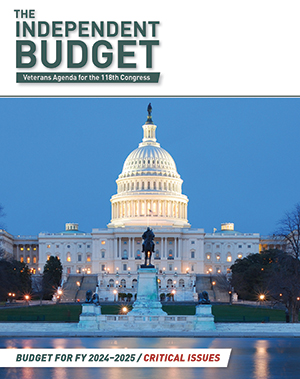 The Department of Veterans Affairs must fill tens of thousands of health care and support positions, faithfully implement the largest expansion of veterans benefits ever and work with Congress to develop a new infrastructure strategy, according to The Independent Budget Veterans Agenda for the 118th Congress.
The Department of Veterans Affairs must fill tens of thousands of health care and support positions, faithfully implement the largest expansion of veterans benefits ever and work with Congress to develop a new infrastructure strategy, according to The Independent Budget Veterans Agenda for the 118th Congress.
For more than three decades, the Independent Budget (IB) partners—DAV, Veterans of Foreign Wars and Paralyzed Veterans of America—have offered crucial fiscal recommendations for the VA so the agency charged with caring for our nation’s veterans can meet current and evolving needs.
The group released the annual report in February, providing an impartial picture of the budgetary requirements across five critical issue areas.
“After almost three years of the pandemic, it appears that COVID may be nearing its endemic stage, and one result could be greater predictability of VA’s funding needs,” the IB partners wrote.
For fiscal year (FY) 2024, the IB partners recommend $139.9 billion in total medical care and $157.2 billion for FY 2025 advance appropriations. This recommendation “reflects the increased funding baseline for all medical care programs established over the past two years, continuing enrollment increases, higher inflation, a federal pay raise and rising workloads,” the report states.
Medical job vacancies have plagued health care systems nationwide. And as the nation’s most extensive integrated health care apparatus, the VA has staffing issues that match those of the greater workforce. A 2022 VA staffing report said the department had more than 76,000 openings—double the number of vacancies from the previous year.
For FY 2024, the IB partners recommend that the VA “pursue an aggressive hiring trend” by filling 19,200 full-time employee positions, at a cost of about $2.8 billion.
When the Honoring our PACT Act became law last year, it ushered in a new era for veterans exposed to toxic substances. The Independent Budget states that the law will require flexibility as it greatly expands VA health care eligibility.
“While it is too soon to assess how many veterans will apply under the PACT Act and what the resource requirement will be in the next few years, [the] VA and Congress must monitor enrollment and application trends closely and make any necessary adjustments to funding before and during FY 2024,” according to the report.
Congress scrapped the VA’s Asset and Infrastructure Review last year, rejecting a plan to close or overhaul medical facilities that do not meet veterans’ health care needs. The commission was mandated by the 2018 MISSION Act, a bill to give veterans more medical care options.
The IB partners recommend that Congress and the VA reengage on infrastructure and develop a new strategy to build, repair and realign VA assets and properties. With a rapidly aging veteran population, that plan should also aim to meet the specialized long-term care needs of veterans, including those with spinal cord injuries.
“This Congress will be responsible for equipping [the] VA to provide the benefits and services veterans earned and at the quality they deserve,” said DAV National Legislative Director Joy Ilem. “The Independent Budget is a critical guide for lawmakers who will consider many important issues directly impacting veterans’ lives.”






